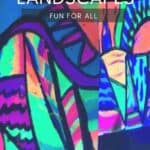Fun Heather Galler Art Lesson For Kids
Are you looking for a new lesson that will make your students feel successful in your art class? We always love using famous artists as inspiration and it is even better when they are contemporary artists. Create awesome fold art landscapes with this Heather Galler lesson plan idea.
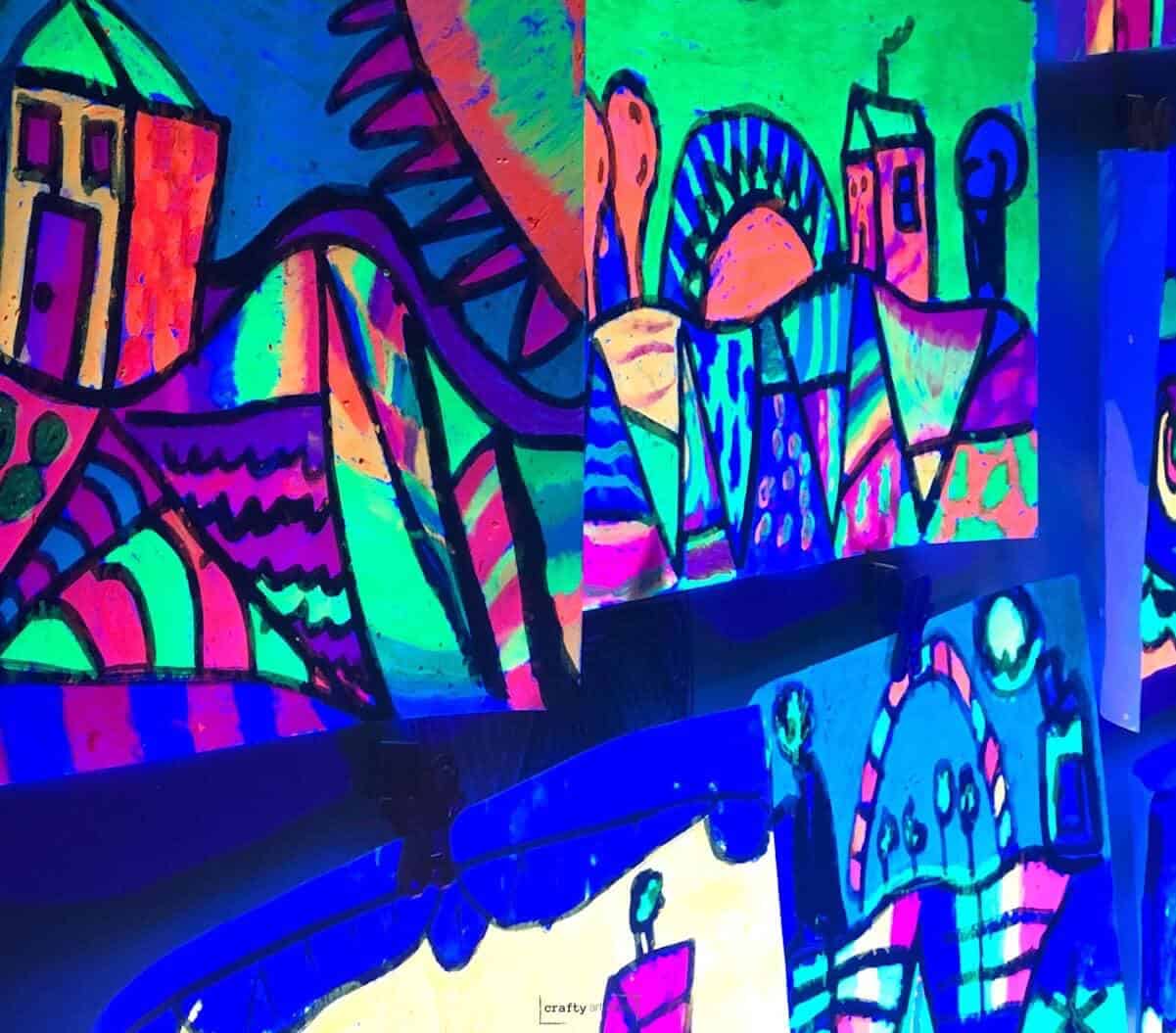
Disclosure: We only recommend products we would use ourselves and all opinions expressed are our own. This post may contain affiliate links when clicked, we may earn a small commission at no additional cost to you. Read our full privacy policy.
How will students create landscapes?
Your children will develop new skills while creating their own easy landscape ink drawing with a glow-in-the-dark end result.
You can always modify this lesson plan to use any materials of your choice. However, kids absolutely love seeing their artworks glow in the dark.
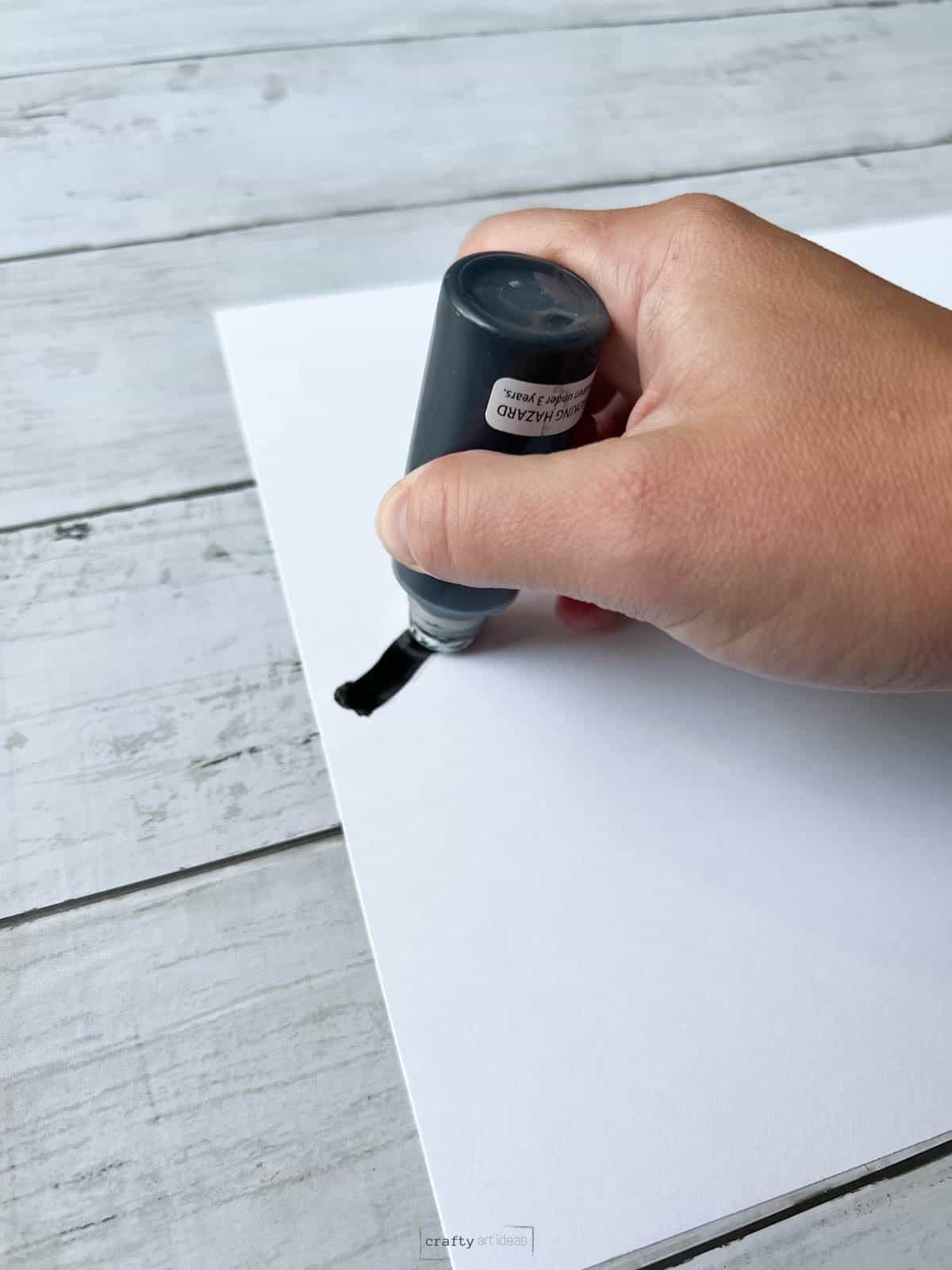
What age is this project for?
Elementary art teachers (and parents at home) will love this art lesson plan is great for a variety of grade levels. We think it is perfect for 2nd grade and up. You can modify this art project by making more advanced designs and patterns.
Other Heather Galler Inspired Art Lessons
From different materials to trying a new subject matter, there are a lot of ways you could use Heather Galler as inspiration in your art room. Here are a few ideas you could use to modify this art lesson.
- Draw with colored markers
- Oil pastel and watercolor paint resist
- Watercolor paint first with tempera paint on top for details
- Use her portraits as inspiration to create a self-portrait lesson
- Design your own pet inspired by her pet portraits
Who is Heather Galler?
Heather Galler is an abstract folk artist who uses bright colors and patterns in landscapes, portraits and cheerful still lives. She is a contemporary American artist. For this art project, we looked at her landscapes for our art history discussion.
Resources For Work of Artist Heather Galler
We like using these two slide shows on YouTube when we discuss her artwork.
What is folk art?
Folk Art is the art of the everyday. Folk art pieces, such as quilts and other items, can be decorative or utilitarian. Normally folk artists aren’t trained professionally in the arts.
According to the introduction of Folk Art Fusion by Heather Galler, folk art “is created mostly by untrained artists” and truly shows the human spirit through artwork.
Discussion Ideas and Questions To Ask When Looking At Her Work
- What shapes do you see?
- How would you describe the lines?
- Did she repeat patterns? How does this create balance?
- Why do you think she chose to make her landscapes in this style?
What art principles is her artwork great for?
We love using her patterned landscapes for students to understand balance. They easily can see how she spaced out some of her designs.
Her artwork also opens the discussion about giving your eye somewhere to rest. The kids who understand you don’t need to fill the whole page with patterns normally have great results.
Art Concepts Taught
- What is a landscape?
- Elements of Art: line, shape, color
- Balance: you can also teach about symmetry with these easy mandala art lesson for kids
- Pattern
- Focal Point
- Depth: the diagonal lines going back into space help create the illusion of space.
- Folk Art
Recommended Supplies
- Empty Bingo Dauber Bottles
- Diluted India Ink (we do about 1/2 water and 1/2 ink)
- Neon Oil Pastels- Sargent or Crayola
- Pencils
- Black Lights
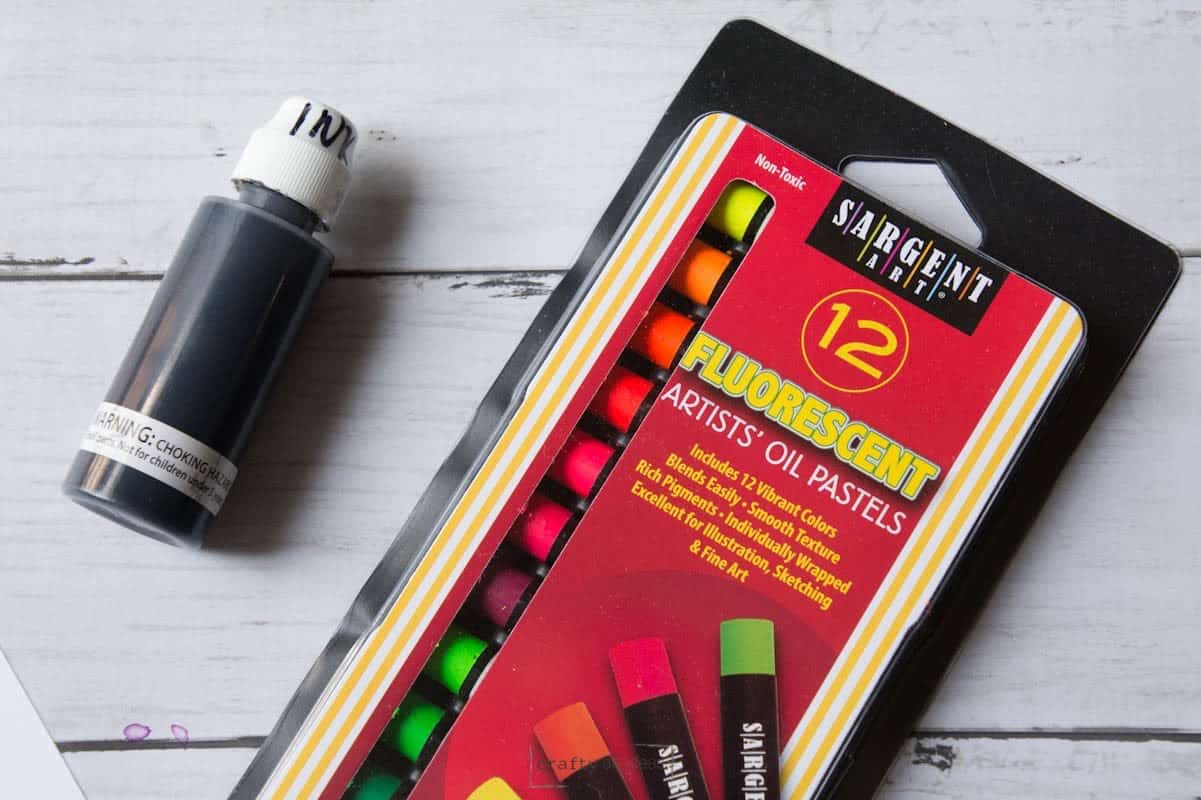
What if you don’t have ink daubers?
You can complete the black outlines with a permanent marker. We love showing kids new materials and ideas. Ink daubers are really such a fun and easy way to get different types of lines with younger children.
Read More>>>>>See Our Tips for Using Ink Daubers With Kids in this post.
Day 1: Discuss Artwork and Draw A Landscape With Ink
Watch Slideshows and Discuss Her Work
Look at the slideshows of artworks by Heather Galler with your young artists.
We also like to watch all the way through and then go back and pause certain artworks. You can use your own questions or look at the questions above to help get your students talking about the Art Elements and Principles of Design.
Draw Landscape With Ink
Draw a landscape with ink daubers on heavy drawing paper following the steps below. We like to do these on 12″ x 18″ white drawing paper. If you are not using ink, then you can get away with a smaller piece of paper.
How To Draw A Simple Landscape With Ink
Follow these simple steps to draw a landscape in the style of Heather Galler
Step 1: Draw Horizon Line
Draw a horizon line with an ink dauber. Encourage children to make it straight or slight wavy (but not too wavy).
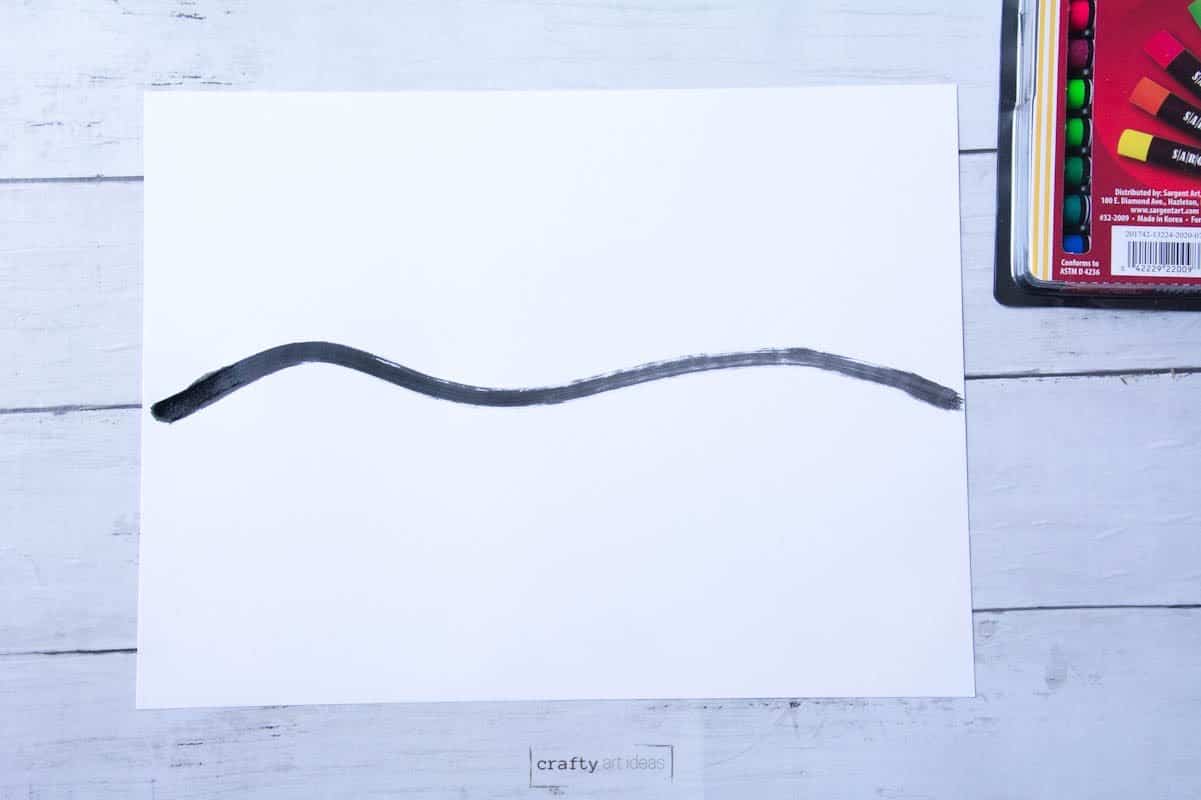
Step 2: Split Up The Ground
Draw 5-7 diagonal black lines.
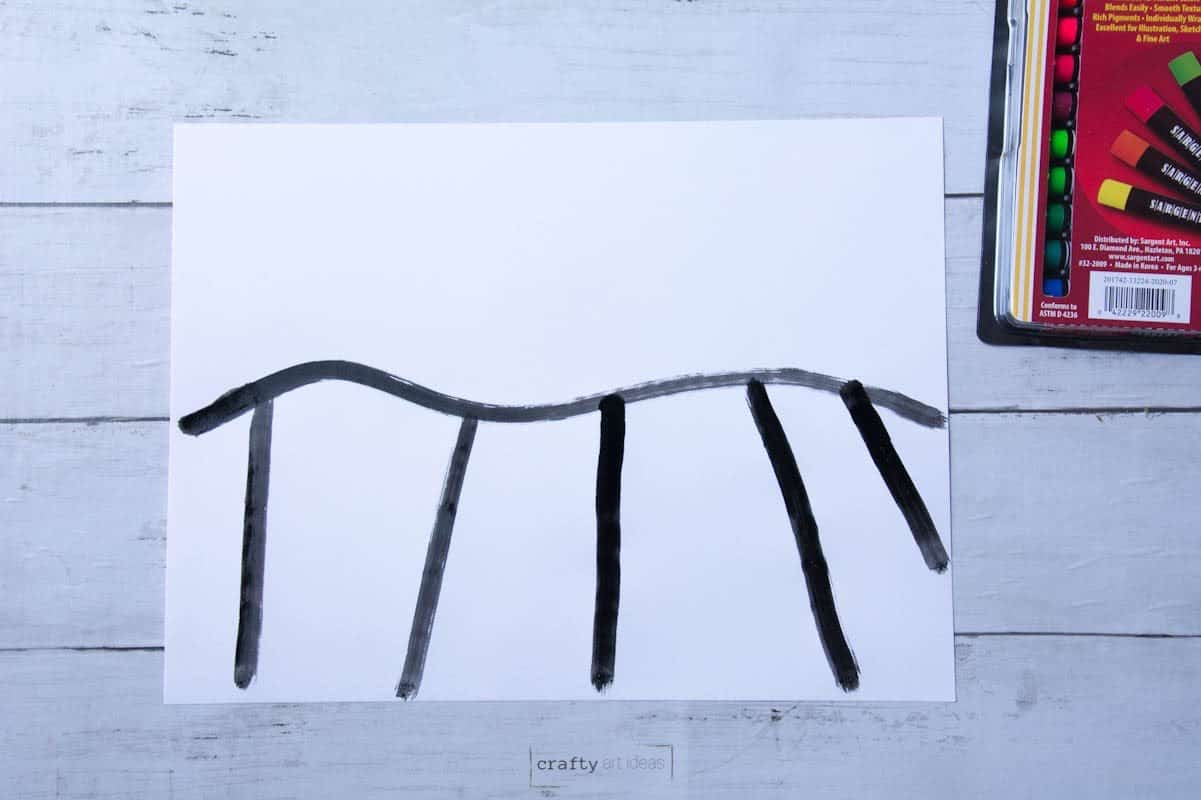
Step 3: Divide Large Sections With Lines
Split the sections into two with a horizontal line.
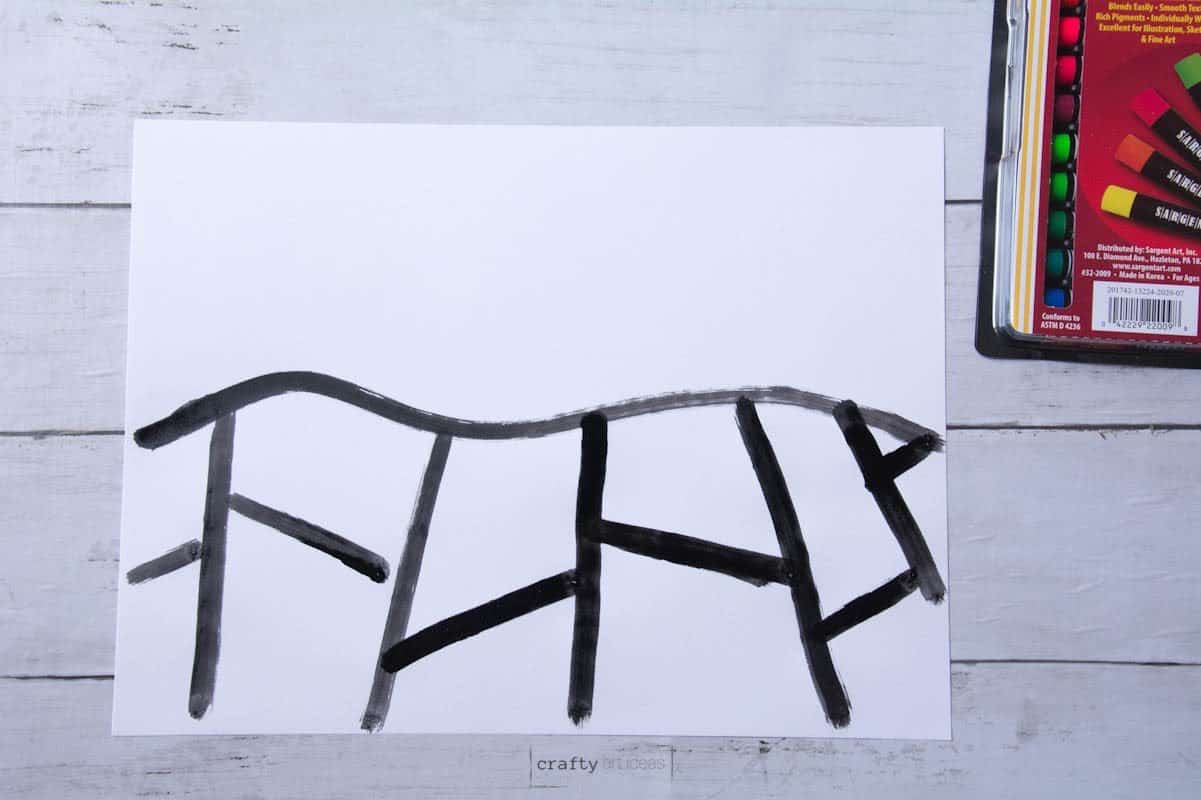
Step 4: Add Details
Add unique designs and details such as a house, sunset, and trees. A little bit will go a long way here. You could look up pictures of farms and other outdoor scenes for inspiration.
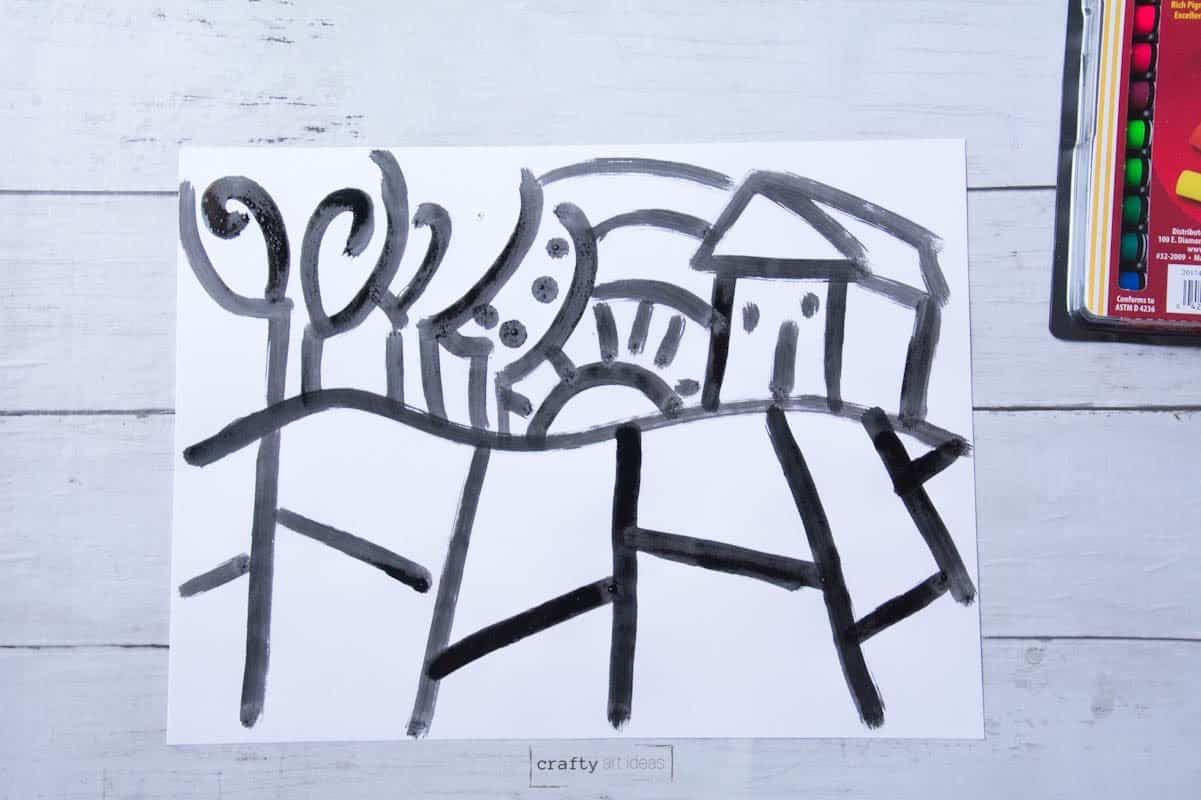
The biggest challenge is getting children to add enough detail without overdoing it. They should still have some negative space in the sky or other areas.
Step 5: Let landscape ink drawings dry.
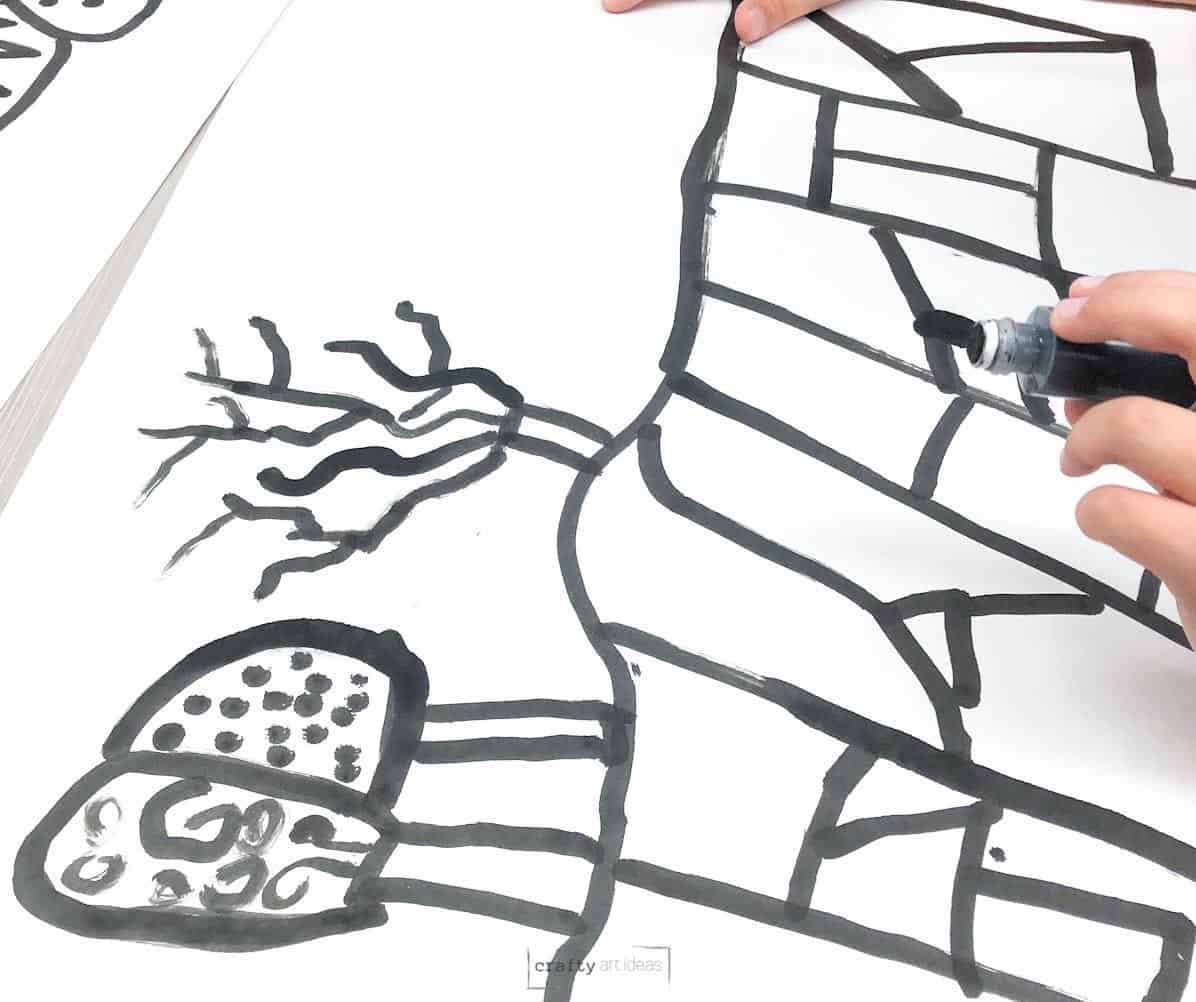
Day 2-4: Begin To Use Neon Oil Pastels
Neon Oil Pastels
Use neon oil pastels to create fun patterns below the horizon line. Review how to create balance in your artwork.
Step 6: Start With Patterns In The Ground
Continue with oil pastels in the ground first. Encourage children to come up with creative patterns and not just the typical polka dots.
Here the artist was pressing a little too hard. Children needed to be reminded to not press too hard or they end up with “boogers”.
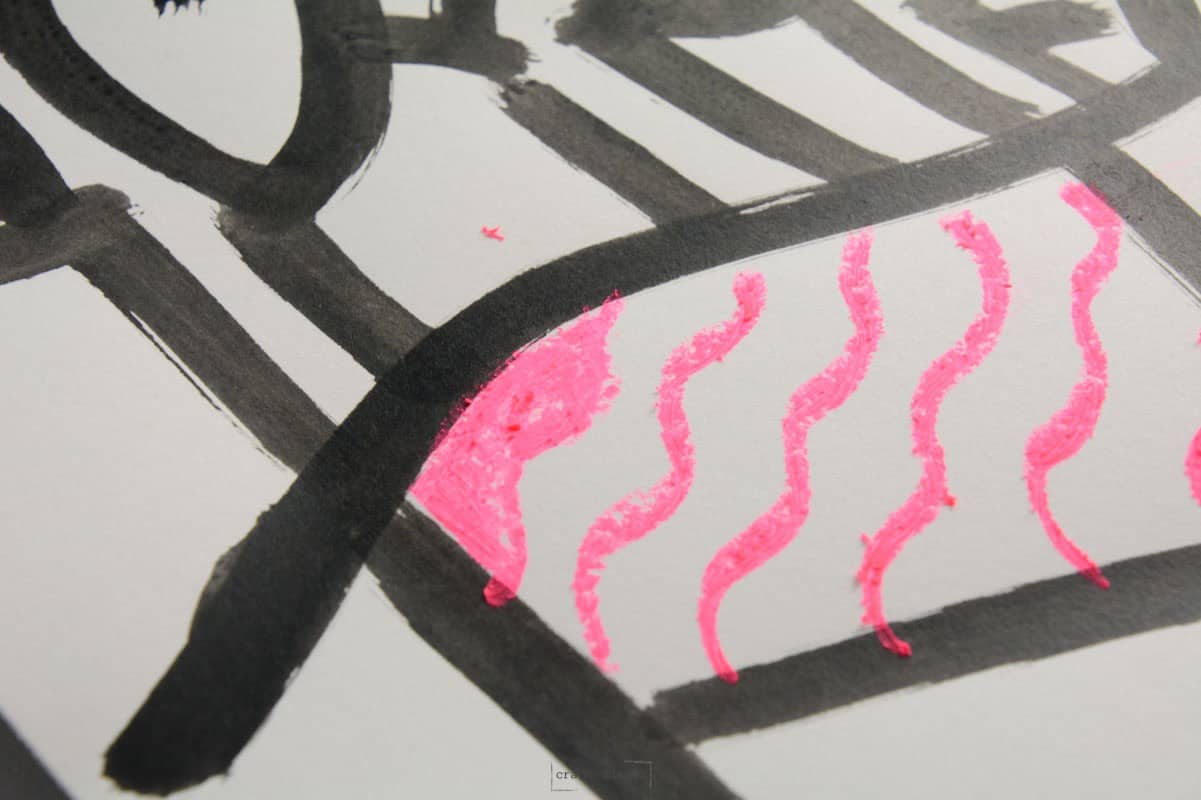
Step 7: Continue Using Oil Pastels
Once the ground is complete, add oil pastels to the trees/etc.
Only Use One or Two Colors In The Sky
Finish the oil pastel drawing by only using one or two colors in the sky. If students used mostly warm colors in their patterns, maybe encourage them to use cool colors for the sky.
Students will understand why if you talk about what would happen if they made everything too patterned or too colorful.
The End Result
Seriously, kids will love how these turn out. Every year, they are amazed at looking at their artworks under the black lights. We just love this art project for kids.
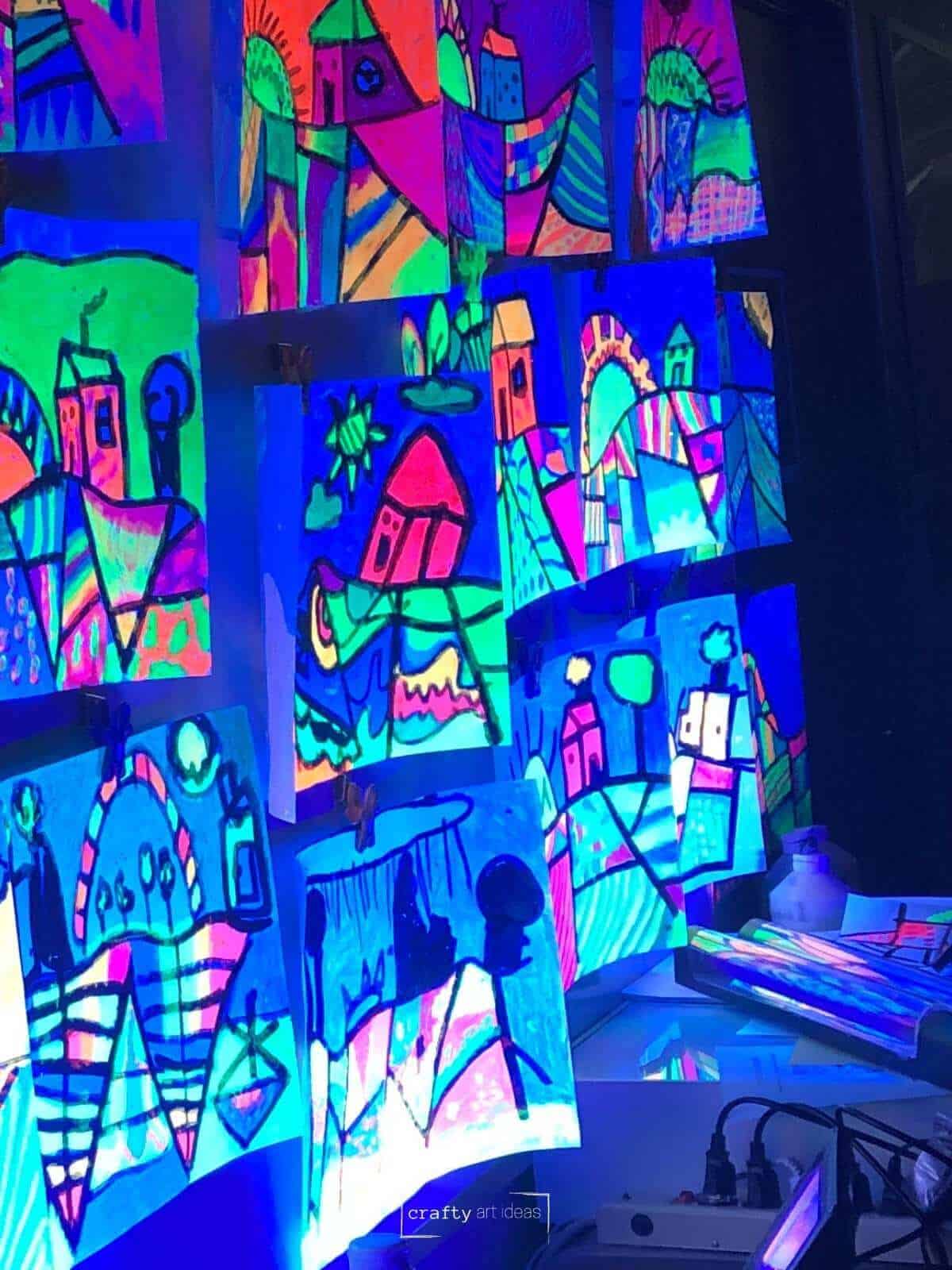
Art Lesson FAQs
The projects you are seeing here are done with Sargent Neon Oil pastels. They can be difficult to find at a cheap price, so make sure you shop around. Crayola also has a neon oil pastel that would work well.
The biggest con to the Sargent brand is that they are very soft and you have to encourage kids to color lightly with them.
In addition to neon oil pastels, Fluorescent Tempera Cakes, Fluorescent Liquid Watercolor Paint, Fluorescent Tempera Paint, Neon Tape, Fluorescent Tagboard or Paper will all glow in the dark.
More Art Ideas Inspired by Women Artists
- Georgia O’Keeffe Inspired Lesson is great for all elementary-aged children. You could even use neon oil pastels instead of regular ones.
- Bridget Riley Inspired Art Lesson: use the Op Art movement to inspire your students.
This Heather Galler-inspired art lesson is so fun whether you choose to create landscapes or other fun glow-in-dark artworks with kids. Everyone will love seeing these finished glow-in-the-dark art pieces in your art gallery.
Do you like this art project? Please give us 5 stars below 🤩🤩🤩🤩🤩 and have fun being creative with your family.
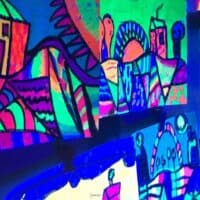
Easy Folk Art Landscape Lesson For Kids
Equipment
Materials
- Empty Bingo Dauber Bottles
- Diluted India Ink we do about 1/2 water and 1/2 ink
- Neon Oil Pastels- Sargent or Crayola
- 12" x 18" Heavy White Drawing Paper
Instructions
- Draw landscape with ink. Start with the horizon line.
- Draw 5-7 lines to divide up foreground.
- Draw extra lines to split those shapes.
- Add details such as a house, sunset or trees.
- Let ink fully dry.
- Use neon oil pastels in the ground. Create unique and interesting patterns.
- Continue using oil pastels in the details and one or two colors in the sky.
- Display under black lights for all to see and enjoy.
Notes
- You can use a variety of art materials to complete this project.
- If you do not want to use oil pastels for the whole drawing, watercolor paint would work to give your artwork contrast.

